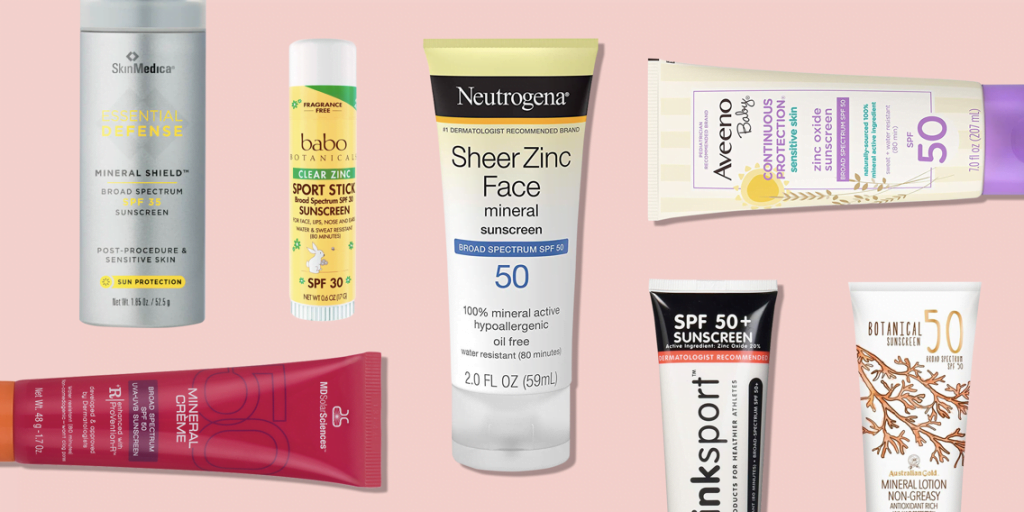With the increase in screen time on computers, tablets, and phones, there are harmful lights that can cause damage to your skin and, according to dermatologist, the sun can seep through glass windows. So, yes, you need to wear sunscreen. You may think your skin is exempt from being exposed to the sun since you’re staying indoors, but that’s incorrect. So, yes, you need to wear sunscreen. Therefore, it’s really important to include sunscreen to your daily skincare routine.
Sunscreens have never been as popular as they are today. There are two main types of sunscreens based on their active ingredients:
Sunscreens have never been as popular as they are today. There are two main types of sunscreens based on their active ingredients: physical sunscreens and chemical sunscreens. Ingredients vary worldwide. Physical sunscreens usually use zinc oxide and titanium dioxide. In contrast, chemical sunscreens have active ingredients such as include oxybenzone and octocrylene.
Both types of sunscreens have their strengths and weaknesses. Chemical sunscreen typically has higher SPF and strong UVA protection. The drawback is that some have allergic reactions to certain chemical sunscreen ingredients. Physical sunscreens are great for those with sensitive or eczema-prone skin. The significant con is the white cast showing on darker skin.

How do sunscreens work?
Sunscreens work in two ways. Either scattering or absorbing ultraviolet (UV) radiation to help stop it from reaching the skin. Those that disperse UV rays are called physical blockers and include zinc oxide and titanium dioxide. Those that absorb UV light are called chemical blockers and include oxybenzone and octocrylene.
What is SPF?
SPF stands for the sun protection factor. It relates to the time it takes for redness to appear on the skin compared to when no product is applied. For example, if it takes 10 minutes for unprotected skin to show redness, then an SPF30 sunscreen should take 30 times longer (300 minutes) to burn. For SPF 50, it will be 50 times longer (500 minutes). Factors such as skin type, UV levels, swimming/drying, and the quantity of sunscreen applied can also affect protection. In theory, there isn’t a big difference between SPF 30 and 50. However, when considering the other factors mentioned above, it is always better to start with a higher level of protection.
Do I have to wear sunscreen every day?
Yes! People often believe they are protected from the UV light because they work indoors/never go outside/avoid the sun. But they forget all the incidental sun exposure that they get. UVA can penetrate through clouds and window glass. So, it is essential to wear sunscreen at least to the face daily.
How much do I need to apply?
Liberally! Evenly apply to clean skin 20 minutes before UV exposure to create the intended protective barrier. For an adult, the recommended amount to apply sunscreen is one teaspoon for the face.
Do I need to reapply?
Yes! Sunscreen needs to be applied every 2-3 hours, irrespective of water resistance – it is water-resistant, not waterproof. Swimming, sport, sweating, and towel drying can reduce the effectiveness of the sunscreen. So sunscreen should be reapplied after these activities, regardless of the time since the last application.
Is SPF in my moisturiser/makeup enough?
No. Mostly because we tend not to use enough. If you’re trying to skip a step, choose a hydrating sunscreen instead so that you may not need to use a separate moisturiser.
Benefits of wearing sunscreen at night
It’s not certainly that beneficial to use sunscreen at night. It do have some effects. Sunscreen blocks/absorbs the UV light from the sun. Once evening commences, there’s no point wearing it. Some may argue that the moon reflects UV rays it absorbs from the Sun. The light from the moon is so negligible so it’s impossible to see the effect from the sunscreen. But if you work on electronic devices then you can apply sunscreen because it will protect you from the radiations of the devices. The other benefit one can think of is if it has moisterising properties. If that’s the case, we recommend you to better use an actual moisturizer.
Can we apply fairness cream after sunscreen
Comments are closed.